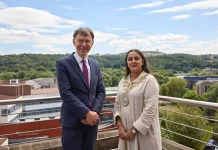They may be separated by more than 3,000 miles yet the University of Huddersfield has cemented its ‘close relationship’ with an institution that will play a key role in shaping a new future for Libya.
Senior figures from the Benghazi University came on a fact-finding visit earlier this week and signed a special ‘Memorandum of Understanding’ when they visited the West Yorkshire town.
The result will mean larger numbers of Libyans continuing their studies at Huddersfield and a succession of Benghazi staff visiting the University for research sabbaticals.

There are already some 200 Libyan students at the University of Huddersfield, mostly studying for postgraduate degrees, including PhDs, across a wide range of courses.
All four visitors were present when a ‘Memorandum of Understanding’ was signed between the University of Huddersfield and Benghazi University in Libya
The visitors from Benghazi University were Professor Mohammed S. Abuamoud, of its Department of Electrical Engineering, and Dr Ibrahim Rustam, who is Deputy Dean of the School of Engineering.
They spent two days at the University of Huddersfield, inspecting all of its academic schools and stating that they were impressed by the staff, the facilities and the levels of collab-oration between the different schools and their varied research areas.
The two men also met many Libyan students and took a keen interest in the University of Huddersfield’s links with business. When replicated in Libya, this could be an important element in rebuilding the country.
The ‘Memorandum of Understanding’ was co-signed by Professor David Taylor, who is the University of Huddersfield’s Pro Vice-Chancellor, International.
Professor Andrew Ball, who is Pro Vice-Chancellor for Research and Enterprise, has also been closely involved in fostering the Libyan link.
He said: “The universities in Libya will be key to the shaping the future of the country, not only through providing education, but supporting wider business and social change.
“The University of Huddersfield is well placed to support such ambitions and looks to use the ‘Memorandum of Understanding’ as a platform on which to build collaboration contracts around future student admissions, curriculum design, teaching methods and providing sabbatical opportunities for academic staff from Benghazi University.”















